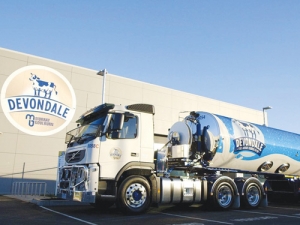Forget about another share trading review
Former Fonterra director Nicola Shadbolt says the recent collapse of a few dairy cooperatives should be blamed on their strategy, not their co-op structure.
 Oz co-op, Murray Goulburn has dropped its milk price, lowered profit guidance and lost its top two executives.
Oz co-op, Murray Goulburn has dropped its milk price, lowered profit guidance and lost its top two executives.
Plenty has been written about the dramatic slump in the earnings and milk price outlook for Australia's largest farmer-owned dairy company.
I don't wish to add to discussion on what, why or how that happened at Murray Goulburn. It is now fact, it can't be undone, and there is little merit or therapy gained in maintaining the rage and spending time on recriminations.
More useful is to consider the effect of this sudden downturn in available milk prices from MG on the Australian dairy sector as a whole, and on individual producers, considering the market and industry outlook. The outcome has implications for almost every dairy farmer, who can expect milk prices in the coming years to be lower than if MG had managed to deliver on this year's forecasts.
This event has a number of impacts – on leverage, confidence and reputation, in that order.
Leverage
'Leverage' here refers to the ability of a large farmer-owned milk buyer to positively influence milk prices paid by its competitors. In recent years, MG has focused on improving performance in milk prices, forcing its competitors to match or better it.
When the major farmer-owned buyer of milk has been weakened, effective leverage at farmgate can't be sustained. Almost every dairy farmer on the eastern seaboard is adversely affected, in respect of available milk prices, by a weakening of the major co-operative.
In the short term it seems Murray Goulburn's competitors will continue to honour milk price estimates for the 2015-16 season which were made prior to 27 April. They will do this with some difficulty given the realities of the dairy commodity markets.
The coming seasons are what matter. Despite what will be claimed, with a 20-30c/kgMS finance charge against their largest competitor's milk pool, Bega, Warrnambool, Fonterra and others will be under much less pressure to optimise farmgate prices, other than the need to ensure they can reliably collect enough milk for their business needs.
That was the situation in the industry prior to 2013 and it will go on for the next two seasons at least, as the effects of this event are unwound.
Confidence
Years of research into what mostly affects the confidence of dairy farmers have shown that a positive belief in the industry's future depends on the outlook for milk prices. While MG's balance sheet will be used to sustain most of the current season's promised milk price, the prospects for the next few seasons matter most for producer confidence.
Dairy commodity prices drive the value of milk in the industry; despite lower industry exports than previously we are still inextricably part of a global market.
Dairy companies have different business models, product and market mixes – and different abilities to flex. Over time, some will do much better than others in outperforming the price extracted from a commodity manufacturing base – 'adding value' as it is unfortunately called.
By our reckoning, the commodity value of milk is close to $4.50/kgMS in 2015-16. At present, with spot and forward prices in the market, we have trouble getting our estimate of commodity returns for the 2016-17 season to land above $5/kgMS. Dairy product prices, on average, will have to rise at least 15% (as a season average) to get there, but by 25% before we can be confident milk is again worth more than $5.50. If the A$ falls – as currency punters are suggesting – that farmgate price result will be easier to achieve. Companies can and will add to this commodity return via their various activities. But it all comes back to what the biggest player can achieve, and how much of the strategy can deliver in additional income.
What are the chances of either of those market outcomes? On our present outlook, a recovery in dairy prices is gradually underway, but won't really make any headway until early next year when slower growth in Europe and NZ ensures global export supply slips behind import demand. Right now, those supply and demand totals are running neck-and-neck currently, but stockpiles of powder and cheese are still building.
• Steve Spencer is a director of Fresh Agenda, an Australian food industry market analyst.
There was much theatre in the Beehive before the Government's new Resource Management Act (RMA) reform bills were introduced into Parliament last week.
The government has unveiled yet another move which it claims will unlock the potential of the country’s cities and region.
The government is hailing the news that food and fibre exports are predicted to reach a record $62 billion in the next year.
The final Global Dairy Trade (GDT) auction has delivered bad news for dairy farmers.
One person intimately involved in the new legislation to replace the Resource Management Act (RMA) is the outgoing chief executive of the Ministry for the Environment, James Palmer, who's also worked in local government.
T&G Global says its 2025 New Zealand apple season has delivered higher returns for growers, reflecting strong global consumer demand and pricing across its Envy and Jazz apple brands.
President Donald Trump’s decision to impose tariffs on imports into the US is doing good things for global trade, according…
Seen a giant cheese roll rolling along Southland’s roads?